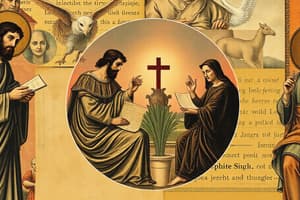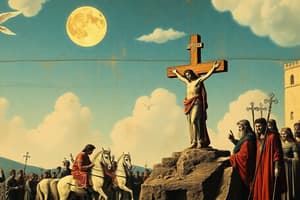Podcast
Questions and Answers
Which of the following is NOT considered one of the four major foundations of Early Christianity?
Which of the following is NOT considered one of the four major foundations of Early Christianity?
- Keeping alive the memory of Jesus
- Ecumenical Councils
- The ministers of the Church
- Establishing monasteries (correct)
The letters of St. Paul were written after the Gospels.
The letters of St. Paul were written after the Gospels.
False (B)
What are the four Gospels that are accepted as authentic accounts of Jesus?
What are the four Gospels that are accepted as authentic accounts of Jesus?
Matthew, Mark, Luke, John
The brief statement that professes faith begins with 'I ________.'
The brief statement that professes faith begins with 'I ________.'
Match the following components of Early Christianity with their descriptions:
Match the following components of Early Christianity with their descriptions:
What was the primary role of bishops in the early Christian Church?
What was the primary role of bishops in the early Christian Church?
The New Testament contains 27 books that were written in the first century.
The New Testament contains 27 books that were written in the first century.
What are the names of the four Evangelists who wrote the Gospels?
What are the names of the four Evangelists who wrote the Gospels?
What is the primary purpose of the Creeds in early Christianity?
What is the primary purpose of the Creeds in early Christianity?
The bishops in the early Church were considered the successors of the Evangelists.
The bishops in the early Church were considered the successors of the Evangelists.
What is the name of the texts that were written by the Apostles to keep the memory of Jesus alive?
What is the name of the texts that were written by the Apostles to keep the memory of Jesus alive?
The _____ of the Apostles is part of the New Testament.
The _____ of the Apostles is part of the New Testament.
Match the following roles or components of early Christianity with their descriptions:
Match the following roles or components of early Christianity with their descriptions:
Which Apostle is mentioned as having written letters during his travels?
Which Apostle is mentioned as having written letters during his travels?
The New Testament consists of 27 books added to the existing texts of Judaism, which became the Christian Bible.
The New Testament consists of 27 books added to the existing texts of Judaism, which became the Christian Bible.
What were the early church leaders who helped guide the Christian faith known as?
What were the early church leaders who helped guide the Christian faith known as?
Flashcards
What are the four cornerstones of the Early Christian Church?
What are the four cornerstones of the Early Christian Church?
The early Christian Church was established upon four fundamental pillars: the Gospels and Letters of St. Paul to preserve the memory of Jesus, the Creeds to unify the faith, the role of bishops as Church leaders, and Ecumenical Councils for collective decision-making.
What is the New Testament?
What is the New Testament?
The New Testament is a collection of 27 books that detail the life, teachings, and impact of Jesus Christ. It was added to the existing Hebrew scriptures (Old Testament), forming the complete Christian Bible.
Why are the Gospels considered authentic accounts?
Why are the Gospels considered authentic accounts?
The four Gospels (Matthew, Mark, Luke, and John) are considered authentic accounts of Jesus' life because they were accepted by the early Church as reliable sources. Each Evangelist provided their unique perspective on Jesus' story.
What are the Letters of St. Paul?
What are the Letters of St. Paul?
Signup and view all the flashcards
What is a Creed?
What is a Creed?
Signup and view all the flashcards
Who are bishops in the Early Church?
Who are bishops in the Early Church?
Signup and view all the flashcards
What is the purpose of Ecumenical Councils?
What is the purpose of Ecumenical Councils?
Signup and view all the flashcards
What did the early Christians do to keep alive the memory of Jesus?
What did the early Christians do to keep alive the memory of Jesus?
Signup and view all the flashcards
What does the New Testament consist of?
What does the New Testament consist of?
Signup and view all the flashcards
What are the Gospels?
What are the Gospels?
Signup and view all the flashcards
What are the four key pillars of Early Christianity?
What are the four key pillars of Early Christianity?
Signup and view all the flashcards
Study Notes
Four Foundations of Early Christianity
- Early Christian Church built on four major foundations:
- Keeping the memory of Jesus (Gospels & St. Paul's Letters)
- Professing the one faith (Creeds)
- The Church's ministers (role of bishops)
- Ecumenical Councils
Keeping Alive the Memory of Jesus
- Jesus did not write down his teachings
- Apostles wrote down memories, forming the New Testament
- New Testament contains 27 books (Gospels, Acts, Paul's letters, Catholic letters, Hebrews, Revelation) that were added to the Old Testament forming the Christian Bible
- Gospels are historical narratives about Jesus, with the four Evangelists (Mark, Matthew, Luke, and John) each providing different perspectives.
- Letters (Epistles) by St. Paul, written prior to the Gospels, document his life and faith, and address various churches.
Professing the One Faith
- Creed is a brief statement of faith (e.g., "I believe...")
- Consistent use of a creed ensured uniformity of belief among Christians.
The Ministers of the Church
- Churches were established quickly (within 30 years of Jesus' death) in various locations (Jerusalem, Syria, Turkey, Greece, Italy, and Spain).
- Each church had a bishop (successor to apostles), responsible for preaching the gospel and ensuring adherence to creed.
- Bishops and influential teachers (church fathers) guided the community.
- Notable examples include St. Justin (100-165 CE).
Ecumenical Councils
- Occasional disagreements and conflicts in Christian history.
- 4th century, Arian controversy (Jesus not truly divine)
- Emperor Constantine convened the Council of Nicaea (325 CE) to address the Arian controversy and clarify Jesus' divinity.
- Development of the Nicene Creed (still used today), clarifying Jesus' divinity.
- Gatherings of bishops (Ecumenical Councils) have occurred, addressing disputes and clarifying beliefs.
- 21 Ecumenical Councils have been held in Church history, each named after the location of the council.
Studying That Suits You
Use AI to generate personalized quizzes and flashcards to suit your learning preferences.
Related Documents
Description
Explore the four foundational aspects of early Christianity, including the significance of the Gospels, the role of creeds, the importance of church leadership, and the impact of ecumenical councils. This quiz will test your knowledge on how these elements contributed to the establishment of the Christian faith and church structure.




